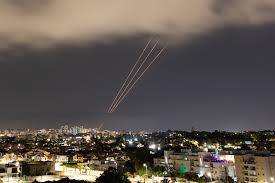Iran executed an attack using drones and missiles on Israel from Saturday night into early Sunday, marking the first direct attack of this nature launched by Tehran against Tel Aviv, approximately two weeks after the bombing of the Iranian consulate in Damascus. The Iranian Revolutionary Guard confirmed the attack “with drones and missiles” on Israel in retaliation for the attack on the Iranian consulate in Damascus last week, which was attributed to Israel and resulted in the deaths of 16 people, including elements and two leaders of the Revolutionary Guard.
At the same time, Iranian allies in the region carried out attacks against Israel, with Hezbollah in Lebanon firing Katyusha rockets towards the Golan Heights, and Houthi forces in Yemen launching drones targeting Israeli territory. Several countries condemned the attack and expressed concern over the escalation. The UN Security Council will hold an emergency session on Sunday at Israel's request to discuss the attack.
An American defense official stated that U.S. forces in the Middle East intercepted drones launched by Iran toward Israel, without providing additional details, while Iran requested that Washington refrain from intervening in the dispute between Tehran and Tel Aviv.
The Iranian mission to the UN declared in a message via social media platform X, “This is a conflict between Iran and the Israeli regime, and the United States should remain detached from it.” The statement added that “the Iranian military action was executed based on Article 51 of the UN Charter concerning self-defense and was a response to the aggression of the Zionist regime against our diplomatic missions in Damascus.” They further noted that “the matter can be considered over. However, should the Israeli regime make another mistake, Iran’s response will be much more severe.”
Explosions were heard in Jerusalem early Sunday, and sirens were activated in the city as well as in northern Israel and the Negev region in the south. The official Iranian news agency IRNA reported that the largest airbase in the Negev in southern Israel suffered “significant damage” after being struck by Iranian missiles during the night. Iranian state television reported that “according to incoming information, half of the missiles launched successfully hit their targets.”
Iranian television referred to “a large-scale attack with drones and missiles” on Israel and quoted the Revolutionary Guard as stating that the operation, named “True Promise,” was “in response to the numerous crimes committed by the Zionist regime, notably the attack on the consular branch of the Islamic Republic of Iran's embassy in Damascus and the martyrdom of a group of our military leaders and advisers in Syria.”
IRNA reported that the “Revolutionary Guard launched dozens of ballistic missiles at specific targets” against Israel. In response, an Israeli army spokesperson stated early Sunday that Iran fired more than 200 drones and missiles toward Israel, adding that “the vast majority” were intercepted. The Israeli army spokesperson, Daniel Hagari, noted in a televised address: “The regime in Iran launched a dense swarm of 200 lethal drones and ballistic and cruise missiles,” indicating that some Iranian missiles landed in Israeli territory, causing minor damage to a military base but no casualties, apart from a “young girl” sustaining injuries.
Israel, along with several regional countries, closed its airspace during the attack. Following the attack, Israeli Prime Minister Netanyahu quickly gathered his aides and war cabinet in a secure location, according to his office. Netanyahu stated on Saturday evening that Israel was prepared “for the possibility of a direct attack from Iran,” and “is ready to confront any scenario, whether defensive or offensive.”
Hezbollah, which has been engaged in daily confrontations with Israel for over six months, announced late Saturday into Sunday that it fired “dozens of Katyusha rockets” at an Israeli outpost in the Golan Heights, while air raid sirens echoed in northern Israel. The British maritime security agency Ambrey reported they received reports that “the Houthis launched drones towards Israel,” noting that the launch was “coordinated with Iran” and highlighted that “Israeli ports are considered potential targets” for the attack.
**International Condemnation of the Attack**
British Prime Minister Rishi Sunak condemned the Iranian attack as “reckless,” asserting that Britain “will continue to defend the security of Israel.” European Union foreign policy chief Josep Borrell stated via X that the EU “strongly condemns” Iran’s attack, denouncing it as an “unprecedented escalation” and a “serious threat to regional security.” UN Secretary-General Antonio Guterres “strongly condemned” the serious escalation represented by the Iranian attack on Israel.
Egypt confirmed through its foreign ministry that it is in “direct contact with all parties in the conflict to try to contain the situation,” warning of the “risk of the conflict expanding regionally.”
**UN Security Council Meeting**
A spokesperson for the Maltese diplomatic mission to the UN, which holds the presidency of the Security Council in April, announced that the council would hold a meeting on Sunday (20:00 GMT). In a letter to the council, Israel’s ambassador to the UN, Gilad Erdan, called for an “immediate meeting to unequivocally condemn Iran for this serious violation,” urging the council to “work on designating” the Iranian Revolutionary Guard as a “terrorist organization.”




